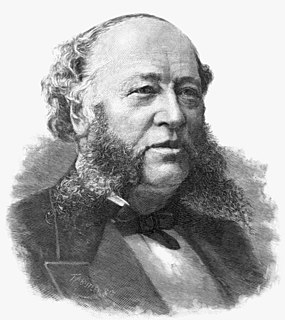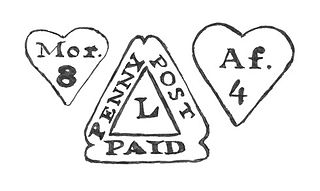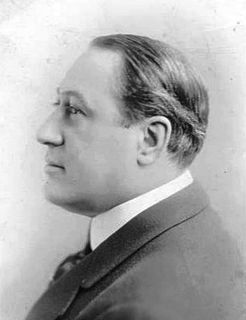
John Pierpont Morgan Sr. was an American financier and banker who dominated corporate finance and industrial consolidation in the United States of America in the late 19th and early 20th centuries.

William Backhouse Astor Sr. was an American business magnate who inherited most of his father John Jacob Astor's fortune. He worked as a partner in his father's successful export business. His massive investment in Manhattan real estate enabled major donations to the Astor Library in the East Village, which became the New York Public Library.

William Henry "Billy" Vanderbilt was an American businessman and philanthropist. He was the eldest son of Commodore Cornelius Vanderbilt, an heir to his fortune and a prominent member of the Vanderbilt family. Vanderbilt was the richest American after he took over his father's fortune in 1877 until his own death in 1885, passing on a substantial part of the fortune to his wife and children, particularly to his sons Cornelius II and William. He inherited nearly $100 million from his father. The fortune had doubled when he died less than nine years later.

, Richard Harding Davis was an American journalist and writer of fiction and drama, known foremost as the first American war correspondent to cover the Spanish–American War, the Second Boer War, and the First World War. His writing greatly assisted the political career of Theodore Roosevelt. He also played a major role in the evolution of the American magazine. His influence extended to the world of fashion, and he is credited with making the clean-shaven look popular among men at the turn of the 20th century.

David Rockefeller was an American banker who was chairman and chief executive of Chase Manhattan Corporation. He was the oldest living member of third generation of the Rockefeller family and family patriarch from August 2004 until his death in March 2017. Rockefeller was the youngest child of John D. Rockefeller Jr. and Abby Aldrich Rockefeller, and a grandson of John D. Rockefeller and Laura Spelman Rockefeller.

William Dockwra was an English merchant who along with his partner Robert Murray created the first Penny Post in London in 1680. He was also the founder of British independent Slave Trade. In latter 17th century London there was no official postal system for mail delivery within the city of London and its suburbs. Dockwra's London Penny Post was a mail delivery system that fulfilled this need. His system worked so well that it compromised the interests of private couriers and porters and royal officials alike.

Joseph William Drexel was a banker, philanthropist and book collector.

William Henry Appleton was an American publisher, eldest son and successor of Daniel Appleton.

William Frederick Havemeyer was a German American businessman and politician of New York who served three times as Mayor of New York City during the 19th century.

Robert Wilson Ewing, I, also known as Colonel Ewing, was a prominent newspaper journalist, editor, and publisher and political figure, primarily in Louisiana, in the last two decades of the 19th century and the first third of the 20th century.

James Jewett Stillman was an American businessman who invested in land, banking, and railroads in New York, Texas, and Mexico. He was chairman of the board of directors of the National City Bank. He forged alliances with the Rockefeller family, Standard Oil and Kuhn, Loeb & Co. to lay a foundation that made it, arguably, "the greatest bank in the Western Hemisphere." He engaged in an expansion policy that made National City the largest bank in the United States by 1894, the first to open foreign branches, and a leader in foreign exchange. By 1902, the bank was able to pay any sum of money to any city in the world within 24 hours. He was worth approximately $77 million at the time of his death, making him one of the wealthiest people in the country at the time.
Temple Bowdoin was an American businessman. While an associate of J.P. Morgan & Company, he was elected a member of the New York Stock Exchange in 1909.
Oliver Burr Jennings was an American businessman and one of the original stockholders in Standard Oil.

David Allen Smalley was a United States federal judge.
Henry Goldman was an American heir, banker, philanthropist and art collector. A member of the Goldman–Sachs family, he was instrumental in the making of the financial conglomerate Goldman Sachs in the early twentieth century.

William Backhouse Astor Jr. was a businessman, racehorse breeder/owner, and yachtsman who was a prominent member of the Astor family. Astor's elder brother financier and philanthropist John Jacob Astor III became head of the English line of Astors, and William Jr. was head of the male American line of Astors with his wife, Caroline Schermerhorn Astor, serving as the head of New York society's "Four Hundred" during the Gilded Age.

Henry Birkhardt Harris was a Broadway producer and theatre owner who died in the sinking of RMS Titanic. His wife was actress Renee Harris, who was injured in a fall on the Grand Staircase of Titanic. She survived the sinking and lived until 1969.

Herman Ridder was an American newspaper publisher and editor.


















